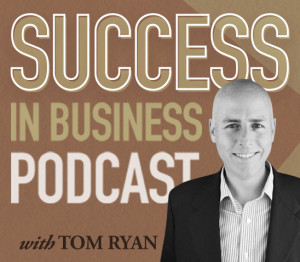Podcast: Play in new window | Download
 Welcome to Episode 243 of the Success in Business Podcast. We are here for you every Monday to teach you about success in business and today is no different.
Welcome to Episode 243 of the Success in Business Podcast. We are here for you every Monday to teach you about success in business and today is no different.
Today Tom has invited two guests to join the show. We proudly welcome CEO Lighter Capital, BJ Lackland and Levi Morehouse the founder and CEO of Ceterus onto the Success in Business Podcast. They are experts in Revenue Based Funding and have great insights for entrepreneurs.
Revenue Based financing can be described as a royalty agreement. It’s a way to acquire capital and pay it back on a schedule that matches the cash flow of your business.
Lighter Capital provides that kind of capital to start-ups and is more interested in helping the companies that they partner with succeed as opposed to getting their money back. Lighter is the more friendly option for start ups looking for capital. They use technology to gather the data more quickly. Additionally they factor in the individual and personal partnership much more highly than other sources of capital including banks would. They want to get to know your business. They are looking at personality and awareness of operation.
Ceterus is a SAS company that started in 2008. In any industry, developing a product is expensive. Ceterus had self-funded the development of a software product to which they were selling subscriptions and it was really taking off. They wanted to be able to keep growing as opposed to holding tight and stagnant. He was in a part of the country that didn’t have a strong angel lending scene and a bank loan wasn’t an option so he looked into revenue based financing with Lighter Capital.
So how does Revenue Based Financing compare to bank debt or equity? Well, Levi explains that Revenue Based Financing is more expensive money than bank debt, but the advantage is that there isn’t a ton of regulation around it and in his case, Lighter Capital sat junior to your bank loan as a way to facilitate businesses getting all he financing they need.
BJ and Levi share some great expertise for entrepreneurs to really do their homework before acquiring any kind of capital. Revenue Based Financing has its pros and cons. Make sure you’re choosing the best option.
Levi is a returning guest to the Success in Business Podcast. You can check out his previous episodes here:
Ep. 223 – From CPA to High-Growth CEO With Levi Morehouse
Ep. 224 – The Challenge of Letting Good Customers Go With Levi Morehouse
Ep. 225 – Keeping Up With Your Company’s Growth With Levi Morehouse
Thanks for tuning in!
Check out BJ Lackland and apply for revenue based financing at LighterCapital.com or contact him by e-mail at blackland@lighercapital.com
Check out Levi Morehouse at Ceterus.com or contact him by e-mail at levim@ceterus.com
Tweet Tom at: @TomRyanAVL
Do you have a question about your business? Tom would love to help you:
Leave a voicemail: (801) 228-0663
E-mail your questions: SuccessInBusinessPodcast@gmail.com
Like this podcast on Facebook
Follow this podcast on Twitter: @TomRyanSIBP
Get every episode free: Subscribe in iTunes
